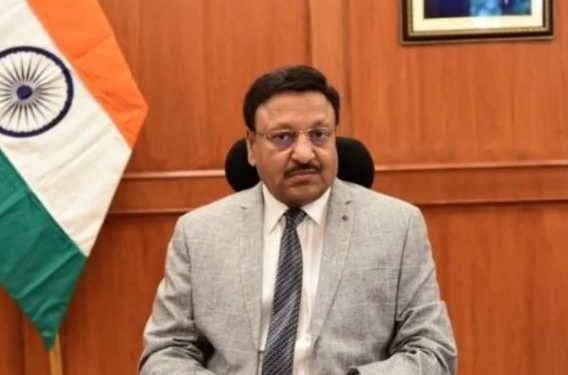New Delhi: Former finance secretary Rajiv Kumar took charge as the 25th chief election commissioner (CEC) Sunday and the first major task before him will be to hold the President and the Vice President elections, which are due shortly.
Kumar said the Commission will follow the time-tested methods of consultations and consensus building in bringing about any reforms and will not shy away from tough decisions, according to an Election Commission (EC) statement.
The elections to the post of President and Vice President are to be held in July-August. The 2024 Lok Sabha polls and several assembly elections will also conducted under the watch of Kumar, whose tenure is till February 2025.
Kumar was part of the poll panel as an election commissioner since September 1, 2020 and was appointed the CEC on Thursday. He succeeds Sushil Chandra, who demitted office on Saturday evening.
According to the EC statement, after assuming charge as CEC, Kumar said he is honoured to have been given the responsibility to lead one of the finest institutions gifted by the Indian Constitution – the institution that reinforces our democracy.
He said that a lot has been done during the last seventy years by the EC to give citizens free and fair elections, ensure the purity of the electoral rolls, prevent malpractices and enhance the quality of elections.
“The Commission will follow the time-tested and democratic methods of consultations and consensus building in bringing about any major reforms,” he said.
He asserted that the EC will not shy away from tough decisions.
Kumar also said that technology will further be made the major instrument for simplification of processes and practices for bringing about transparency and ease of voter services for better election management and operations.
Kumar is known among his colleagues and juniors as a hard taskmaster with a practical approach and penchant for honesty and integrity.
In his previous assignment as the Financial Services Secretary and Finance Secretary, he worked for promoting transparency, technology and protection of hard-earned money of the poor and vulnerable sections of the society, two senior officials who worked with him said.
An official recalled that many wrongdoers in the financial sector space faced the wrath of the law in his pursuit to clean up the banking system struggling with NPAs.
Some of the big names who faced the heat were Chanda Kochhar, Nirav Modi, Mehul Choksi, Kapil Wadhawan, Rana Kapoor and Dheeraj Wadhawan among others.
Kumar proved his mettle even during the most challenging times of COVID-19 when he was appointed chairperson of the Public Enterprises Selection Board (PESB) in April 2020.
Despite lockdown and restrictions due to the outbreak of COVID-19, more than 40 selections were made in just two months through the virtual and physical interview process, another official said.
Some of the reforms undertaken during his two and half years tenure as the Financial Services Secretary demonstrate that cleaning up of banking sector was undertaken in a massive way while equal attention was paid towards furthering financial inclusion with the objective of “banking the unbanked, funding the unfunded and financially securing the unsecured”.
A digital pipeline, which acted as a platform for the transfer of record direct benefits transfer under the Pradhan Mantri Garib Kalyan Yojana during the COVID-19 period seamlessly, was laid during his regime.
The technology platform, created for getting a loan sanctioned online by a bank in less than one hour, is being expanded to bring ease of banking to the post-Covid world.
The passage of the Banning of Unregulated Deposit Schemes Act, 2019 that provided much-needed protection to poor depositors from the menace of illicit deposit taking schemes and an amendment in the Banking Regulation Act to strengthen the Regulatory Powers of RBI over Multi State Cooperative Banks to avoid PMC Bank like frauds were among the efforts towards ring-fencing gullible depositors.
During his regime, bank deposit insurance cover was hiked five times to Rs 5 lakh per depositor.
Before joining the finance ministry in September 2017, Kumar was the Establishment Officer (EO) in the Personnel Ministry.
To foster transparency in bureaucracy, he played a key role in designing a 360-degree appraisal system for the promotion and empanelment of senior bureaucrats during his stint in the Personnel Ministry.
Kumar was also instrumental in streamlining the promotion and appointment process done by the Appointments Committee of the Cabinet (ACC), they said.
He was also a member of the Taskforce for restructuring of NITI Aayog and based on its report, the present structure of the apex public policy think tank was approved.
PTI






































